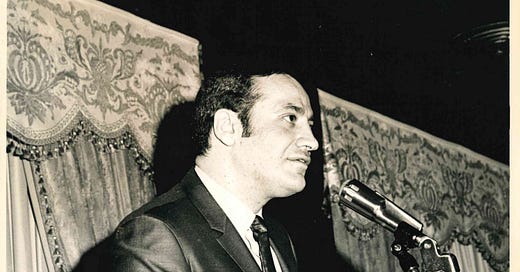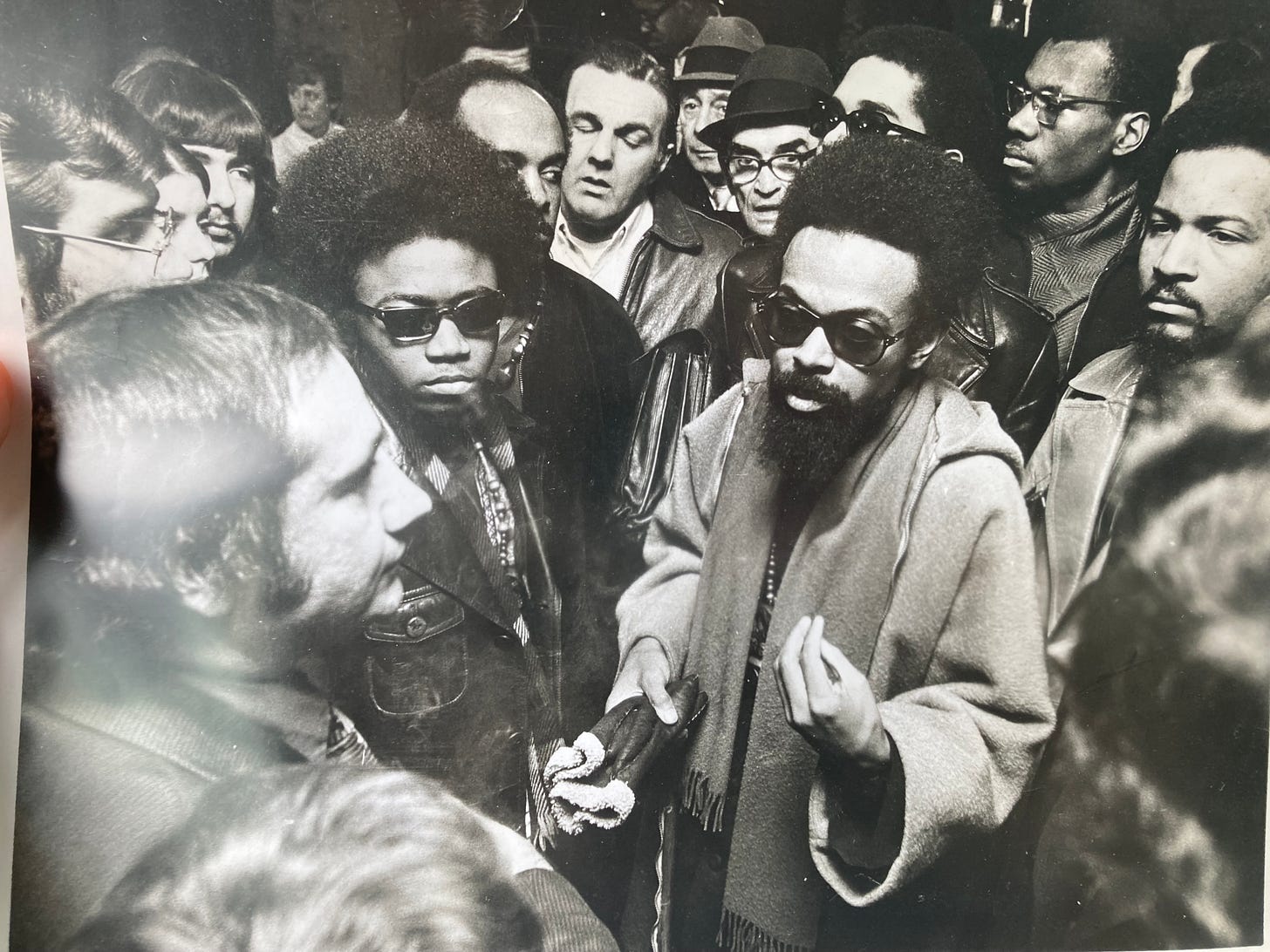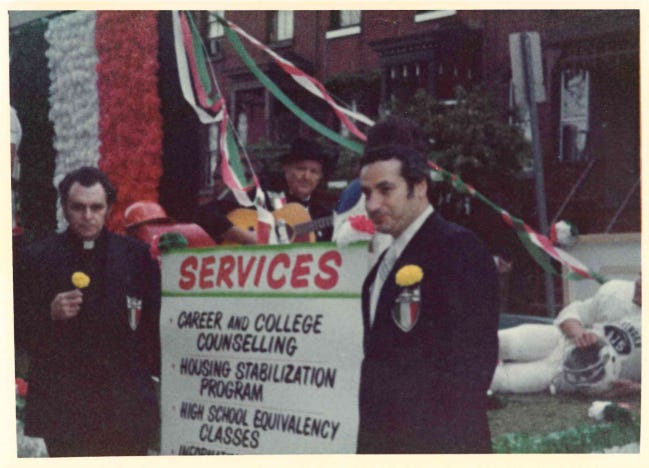I wanted to share this article about my grandfather, Stephen N. Adubato Sr., whose commitment to fostering interethnic and interracial collaboration in urban areas testifies to the values of subsidiarity, solidarity, responsibility, and ethnic rootedness that I often write about. His example has served as a major source of inspiration for my work. Michael Novak (who referenced my grandfather’s work several times in his 1972 masterpiece The Rise of the Unmeltable Ethnics) here offers a profound analysis of my grandfather’s ethnic and social consciousness.
Steve Adubato, Telly Savalas
By Michael Novak, published in Commonweal Magazine, July 26, 1974 (I do not own the rights to this article)
Recently in Newark an election of major significance was not sufficiently remarked by the press. What many of us have been calling "the new ethnicity" met an important test. Mayor Kenneth Gibson, a black, was seeking re-election for a second term and, although the city has a substantial black majority, the black voter turnout is customarily low and Gibson was in trouble. His opposition was Tony Imperiale, a much shrewder and tougher political organizer than his press image as a demagogue suggests.
As it turned out, the key to the election was neither Mayor Gibson nor Mr. Imperiale. One low-keyed active figure was Steve Adubato, a Democratic leader of the North Ward, the Italian section of an almost entirely black city. The Italian voters of the North Ward do vote. With others, Adubato helped convince 20-30 percent of them to vote for Mayor Gibson rather than for Mr. Imperiale
For four years now, Adubato has worked with Mayor Gibson. Each takes pains to fulfill any word he gives the other. Neither has yet given the other cause for mistrust. It is a plus that they also like each other, visit each other often. And that they do not talk liberal talk. They do not appeal for brotherhood, morality, or other fine sentiments. They try to talk about concrete needs and actions, when they talk business, to give their relationship the ring of hard reliability. Adubato helped convince many Italian Americans to vote for Mayor Gibson out of a kind of shrewd self-interest. If we Italians leave Newark, he said, Newark will be all black.
Given the institutional racism of American life, Newark will be treated like a reservation. Neither Mayor Gibson nor other intelligent black leaders want that. Therefore, enlightened black leadership faces a test: how will they deal with the white minority? If they want us to stay, they will have to treat us well. Gibson will have to listen to us. If we vote for Imperiale, he will have to take us for granted; he'll have to prove himself in the other parts of the city; he'll ignore us. It's to our advantage, realities being what they are, to support Gibson.
Without the margin provided by whites, Gibson would have lost the election. A black mayor was retained in part by the white ethnic Italian American voters of the North Ward. (In 1972, Adubato delivered a record 10,000 vote plurality in the North Ward to keep Pete Rodino in office; for the Italian-American votes he delivered for Mayor Gibson against Tony Imperiale, he will no doubt face some political rough water.) Adubato's success is an especially clear example of the new ethnicity, for three reasons. First, he did not direct the vote along superficial ethnic lines (like the old ethnicity) but along the lines of real interest: who will best meet the concrete needs of working class white ethnic neighborhoods.
Second, for five years, Adubato has woven into his political organizing cultural motifs. He has tried to sharpen his people's awareness of themselves as Italian Americans, with an identity, tradition, needs and re-sources of their own. The morale of young people in the North Ward, he felt, was even worse than that of young blacks; the latter at least had a firm identity as blacks. The Italian Americans did not feel either quite Italian or quite American; they could not ignore the slight silent contempt falling upon their heads from almost every quarter.
Thirdly, Adubato's work represents the new ethnicity by giving a taste of political effectiveness, by building leadership, by developing new practical strategies, by achieving a firm political base--all this at the most critical point in American society, in neighborhoods where white and black need each other if either is to survive. What concrete institutions must be available to keep a neighborhood stable, attractive, and happy with itself? bakeries? cheese and wine shops? good produce markets? funds for small businesses? churches? cultural organizations? political cadres? schools? banks that invest in the neighborhood, not outside it? realtors who generate confidence rather than fear? a fair break from the media? a legitimate share of the resources of government designated to aid minorities of all sorts?
There is another feature about the new ethnicity, in Newark and elsewhere, that deserves notice. Telly Savalas of Kojak exemplifies it rather brilliantly. ("Kojak" is a lousy name for an actor who is plainly Greek, just as "Bunker" is a misleading name for a man as Irish as Carroll O'Connor. What do the "creative people" of television know about ethnic cues?)
Telly Savalas as "Kojak" observes the differences between roles and persons, between rules and circumstances. He meets every situation subtly and with nuance, seeing in persons and situations the odd angles that ideologues and puritans tend not to see. His world is a personal world, and he sees persons; it is not an objective or bureaucratic world. Kojak is just another TV adventure show, but it is the first one truly to attempt to convey a Southern European sensibility, a moral and political instinct quite different from that of Anglo-American detectives. (A good appreciation of Savalas' artistry appears in a recent issue of Esquire.)
Telly (short for Aristotle) Savalas is quite American; but he is also Greek. He does not live or work only with Greek Americans. He is not a model of the old ethnicity. But he conveys quite well on television something that Steve Adubato in Newark, Stan Franczyk in Buffalo, Paul Wrobel in Hamtramck, Barbara Mikulski in Baltimore, Gail. Cincotta in Chicago, Father Tolezyk in Brooklyn, and scores of others are trying to do in actual and much besieged neighborhoods of our hard pressed cities. What happens to these white ethnic leaders-and to others who join them week by week--is the most important social barometer in our northeastern and north central states. Hardly anything is more central to the future of our cities, because what happens to them indicates what will happen to poor and working class populations of all our cultural traditions, white and black together.
For more on Steve Sr., check out my article in the National Catholic Register about his work with Fr. Geno Baroni.
$upport CracksInPomo by choosing a paid subscription of this page, or by offering a donation through Anchor. Check out my podcast on Anchor and YouTube and follow me on Instagram and Twitter.









